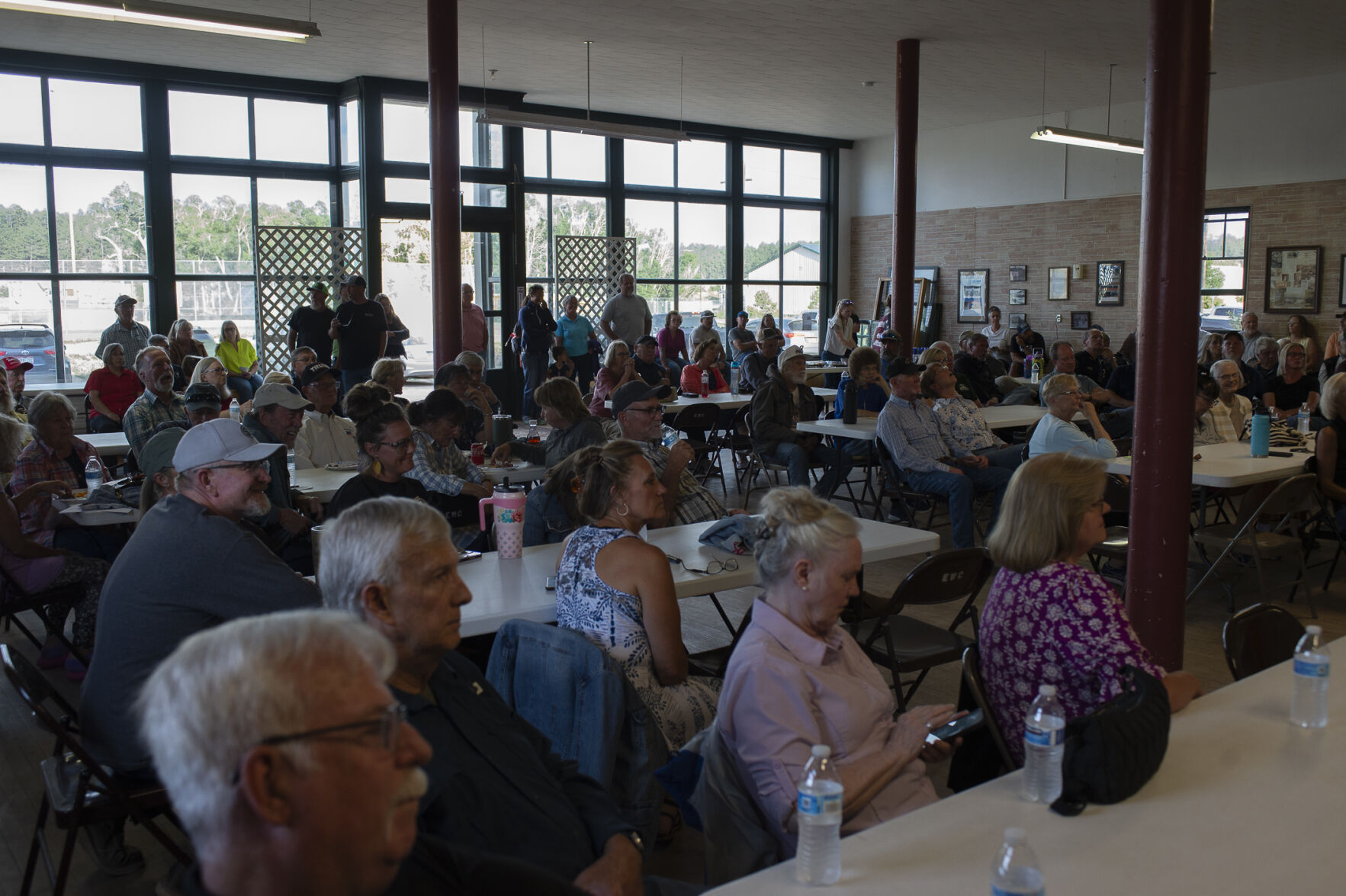Elbert County commissioners face backlash over manager and attorney contracts
Elbert County commissioners faced a tough crowd on Wednesday night, as they tried to justify the hefty contracts they extended to the county’s manager and attorney earlier this year, neither of whom lives in the county.
More than 185 residents packed the historic Gates Mercantile Building in Elbert County for a face-off with commissioners after an uproar over the contracts erupted on social media.
Earlier this year, the Board of County Commissioners extended “Engagement of Service” contracts to County Manager Shawn Fletcher and County Attorney Bart Greer.
Fletcher, who has been on the job for less than 18 months, saw a pay bump of $80,000 over his 2023 contract, bringing his annual salary to $220,000. Additionally, he gets to use a county-owned or leased vehicle, a monthly housing allowance of $1,500, and an extra two weeks (8 days) of vacation leave above his current accrual rate.
Greer, who has represented the county for close to seven years, will also receive an annual salary of $220,000 and use a county vehicle. A previous contract signed by Greer in January 2023 placed his yearly salary at $145,500.
Some residents filed open records requests for the contracts.
Elbert County Commissioner Chris Richardson explained to residents that pay problems within the county are nothing new and years of unskilled HR staff and local competition from neighboring counties are to blame.
In 2012, Elbert County decided to restructure its human resources department in response to its dire financial situation at the time.
Richardson said part of that restructuring was not funding a professional human resources manager because many felt the expertise could be found elsewhere within the county.
“So, for about a 12-year period, we had some folks doing HR but they weren’t on HR professionals,” he said. “They were making sure that paperwork was filed. They were doing the basics, but the recruiting and retention of professional and skilled staff was something that didn’t happen for almost five years.”
Eventually, this resulted in the county having as many as 35 open positions with salaries far below the going market.
As the financial picture improved, Richardson said the county’s goal was to take care of its employees.
What Richardson said the county needed was a compensation philosophy — a starting point that would establish consistency within the county employee system.
“If you’re an admin in the sheriff’s office, or you’re an admin in revenue, or you’re an admin in the finance department, your job has relatively the same scope and responsibilities,” he said. “You could look across the county and there were people that were in jobs very similar with others that weren’t being compensated similarly.”
He suggested that inequitable pay often causes bigger issues with morale, perception of fairness, and other retention problems.
Then there’s competition from neighboring counties and the threat of quality employees being “poached,” he said.
Richardson said the county expects revenues for next year to be relatively flat with some increases in property tax collections resulting from new construction.
When asked if Fletcher and Greer were being courted by other counties, Richardson said both men “regularly receive solicitations from search firms for similar positions in other counties and municipalities both in Colorado and throughout the nation.”
Jill Duvall and other residents have repeatedly questioned whether the county conducted such business “outside the public eye,” and thereby possibly violated Colorado Revised Statute 30-25-103, which prohibits county boards from creating obligations and expenditures against the county unless proper appropriations are made in advance.
Richardson and the board pushed back, citing Colorado’s open meetings law and pointing out that the statute specifically states “day-to-day oversight of employees” is not subject to notice and that individual employee evaluations and compensation discussions are considered “day-to-day,” oversight per a 2015 ruling against Lake County.
“Appropriations for spending do require public notice,” Richardson said. “The county operates multiple governmental funds. The primary fund that supports services to the citizens is the General Fund. So long as spending from this fund does not exceed the full amount appropriated in December for 2024, no additional appropriation is required. Therefore, no notice of or associated public meeting.”
Some residents insisted the decision lacked transparency.
“The issue is process and procedure and transparency,” former Elbert County Commissioner Robert Rowland said. “And I think the question we want to hear the answer is: ‘Did you follow all the rules in statute and procedures that are necessary for open meetings? And were those decisions made and done proper graphics are those statues?'”
“I would say, flatly, yes, we believe this was done correctly,” Richardson responded. “This is the manner in which we have handled the contracts with these two individuals since I’ve been in office. I know things may have been done differently, well, Robert, while you were in office, who helped create the position.”
When asked later by Colorado Politics to clarify, Richardson replied in an email, “We feel that the process followed was appropriate and does not differ from that followed by the county over the past seven years I have been in office.”
“One of our major responsibilities is as fiduciaries and trustees for the county. As such, ensuring the efficient and effective operation of county management and providing continuity of operations is critically important,” he said.
Army veteran Nic Meyer said he’s tried to stay out of county business but grapples with why county money is not better invested in deputy salaries and equipment.
“If you’re going to do it (match market salary and benefits with neighboring counties) for those two individuals … I don’t feel that they’re as critical as the sheriff’s department,” Meyer said as the crowd burst into applause. “Are you going to compensate our deputies to the same standard that you’re compensating your county manager and your county attorney who can share it with the other deputies in the three counts the same benefits that you’re just seeing a same training and equipment?”
“Because if you’re not, you need to take that money that you gave those two individuals and you need to put it to the county’s sheriff’s department,” he said.
Other residents asked why more resources haven’t been invested in improving county roads.
“I’m asking you to increase the priority for our road maintenance,” said one resident who drives out of his way to avoid washboard road conditions in the county. “Part of the way here, I drove with one wheel in the ditch because, honestly, its smoother. Some of the lack of care of the roads is almost to the point of denial of that resource. It’s like having a hospital with the doors locked.”








